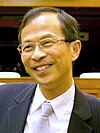
The Liberal Party (LP) is a pro-Beijing, pro-business, and conservative political party in Hong Kong. Led by Tommy Cheung and chaired by Peter Shiu, it holds four seats in the Legislative Council, and holds five seats in the District Councils.

Jasper Tsang Yok-sing is a Hong Kong politician. He is the founding member of the largest pro-Beijing party the Democratic Alliance for the Betterment and Progress of Hong Kong (DAB) from 1992 to 2003 and the 2nd President of the Legislative Council from 2008 to 2016.

The New Territories West geographical constituency was one of the geographical constituencies in the Legislative Council of Hong Kong from 1998 to 2021. It was established in 1998 for the first SAR Legislative Council election and was abolished under the 2021 overhaul of the Hong Kong electoral system. Located in the western part of the New Territories, it was the largest geographical constituency in Hong Kong with 1,308,081 electorates in 2020. It consisted of Tsuen Wan District, Kwai Tsing District, Tuen Mun District, Yuen Long District and Islands District. In the 2016 Legislative Council election, it elected nine members of the Legislative Council using the Hare quota of party-list proportional representation.

Starry Lee Wai-king, SBS, JP is a Hong Kong politician and former chairperson of the largest pro-establishment Beijing-loyalist party, the Democratic Alliance for the Betterment and Progress of Hong Kong (DAB). She is a member of the Standing Committee of the National People's Congress (NPCSC), Legislative Councillor for the Kowloon Central geographical constituency, and a former Kowloon City District Councillor. From 2012 to 2016, she was a member of the Executive Council.

The pro-Beijing camp, pro-establishment camp or pro-China camp is a political alignment in Hong Kong which generally supports the policies of the Beijing central government and the Chinese Communist Party (CCP) towards Hong Kong. The term "pro-establishment camp" is regularly in use to label the broader segment of the Hong Kong political arena which has the closer relationship with the establishment, namely the governments of the People's Republic of China (PRC) and the Hong Kong Special Administrative Region (HKSAR). Pro-Beijing politicians are labeled "patriots" by pro-Beijing media and "loyalists" by the rival pro-democracy camp.
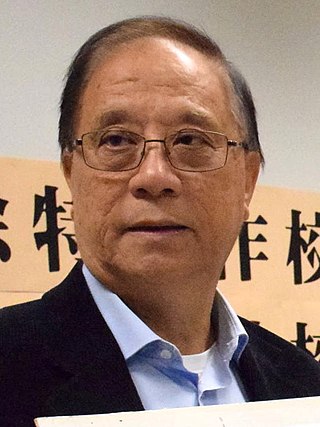
The 2003 Hong Kong District Council elections were held on 23 November 2003 for all 18 districts of Hong Kong, 400 members from directly elected constituencies out of total 529 council members. It was the second District Council election after the handover of Hong Kong in 1997.

The 2017 Hong Kong Chief Executive election was held on 26 March 2017 for the 5th term of the Chief Executive of Hong Kong (CE), the highest office of the Hong Kong Special Administrative Region (HKSAR). Former Chief Secretary for Administration Carrie Lam beat former Financial Secretary John Tsang and retired judge Woo Kwok-hing, receiving 777 votes from the 1,194-member Election Committee.

The 2016 Hong Kong Legislative Council election was held on 4 September 2016 for the 6th Legislative Council of Hong Kong (LegCo). A total of 70 members, 35 from geographical constituencies (GCs) and 35 from functional constituencies (FCs), were returned. The election came after the rejection of the 2016/2017 constitutional reform proposals which suggested the electoral method for the 2016 Legislative Council remains unchanged.
Third Side is a political party in Hong Kong which claims to offer a "third road" to democracy, positioned between the pro-democracy camp and the pro-Beijing camp. It is led by Tik Chi-yuen, who was a co-founder and longtime member of the Democratic Party until his expulsion in 2015 for promoting political reforms proposed by the Chinese central government.

The 2022 Hong Kong Chief Executive election was held on 8 May 2022 for the 6th term of the Chief Executive (CE), the highest office of the Hong Kong Special Administrative Region (HKSAR). Incumbent Carrie Lam, who was elected in 2017, declined to seek a second term for family reasons and finished her term on 30 June 2022. Former Chief Secretary John Lee was the sole candidate approved by the central government of China in the election and the only candidate to be nominated. He received 1,416 electoral votes (99.44%) and assumed office on 1 July 2022.
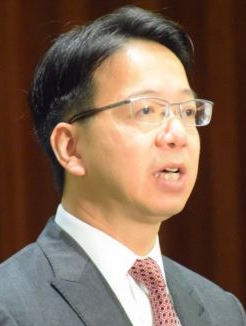
The 2018 Hong Kong Legislative Council by-election was held on 11 March 2018 for four of the six vacancies in the Legislative Council of Hong Kong (LegCo) - the Hong Kong Island, Kowloon West and New Territories East geographical constituencies and the Architectural, Surveying, Planning and Landscape functional constituency - resulting from the disqualification of six pro-democrat and localist camp Legislative Council members over the 2016 oath-taking controversy. The by-election for the two other seats was not held due to pending legal appeals by the two disqualified legislators.

The 2021 Hong Kong Legislative Council election was a general election held on 19 December 2021 for the 7th Legislative Council of Hong Kong. Under the drastic Beijing-imposed electoral overhaul, the total number of seats was increased from 70 to 90 seats, with the directly elected geographical constituencies (GCs) reduced from 35 to 20 seats, the trade-based indirectly elected functional constituencies (FCs) staying at 30, and the additional 40 seats being elected by the 1,500-member Election Committee. therefore still not allowing universal suffrage.
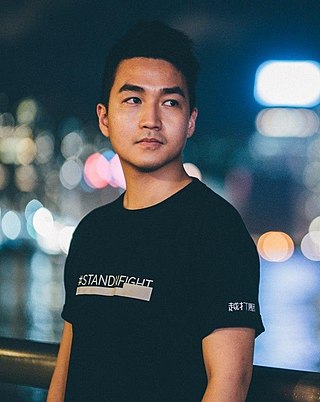
Cheng Tat-hung, also known as Tat Cheng, is a Hong Kong politician, formerly affiliated with the Civic Party. He was a member of Eastern District Council for Tanner from 2016 to 2021.

The Sixth District Councils of Hong Kong was the meeting of the local councils of the Hong Kong Special Administrative Region Government. The membership of the council is based on the 2019 election. The term of the session is from 1 January 2020 to 31 December 2023. The pro-democracy camp in conjunction with the localist camp achieved its biggest landslide victory in the history of Hong Kong, gaining absolute majority in votes and electoral seats in all of the 18 District Councils. The election was widely viewed as a de facto referendum on the 2019–20 Hong Kong protests.
The 2019 Macanese Chief Executive election was held on 25 August 2019 for the 5th term of the Chief Executive of Macau (CE), the highest office of the Macau Special Administrative Region. Incumbent Chief Executive Fernando Chui, who was re-elected once already, was not eligible to run for the office under Macao Basic Law, the mini-constitution of the territory. Ho Iat-seng, former President of the Legislative Assembly of Macau, won as the sole candidate of the election.
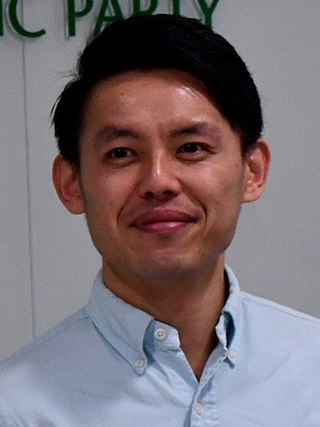
The Democratic Party leadership election was held on 6 December 2020 for the 14th Central Committee of the Democratic Party in Hong Kong, including chairperson and two vice-chairperson posts.
The election for the President of the Fifth Legislative Council took place on 10 October 2012 for members of the 5th Legislative Council of Hong Kong to elect the President of the Legislative Council of Hong Kong for the duration of the council.
Legislative elections were held in Portuguese Macau on 15 August 1984. There were 17 members of the Legislative Assembly of Macau up for election: six directly elected by electorates, six indirectly elected by special interest groups and five appointed by the Governor of Macau.
Legislative elections were held in Portuguese Macau on 11 July 1976, returning 17 members of the Legislative Assembly of Macau, with 6 directly elected by electorates, 6 indirectly elected by special interest groups and 5 appointed by the Governor.
The election for the President of the Third Legislative Council took place on 6 October 2004 for members of the 3rd Legislative Council of Hong Kong to among themselves elect the President of the Legislative Council of Hong Kong for the duration of the council. Rita Fan from the pro-Beijing camp defeated Albert Ho, a democrat, and was re-elected as widely expected.



